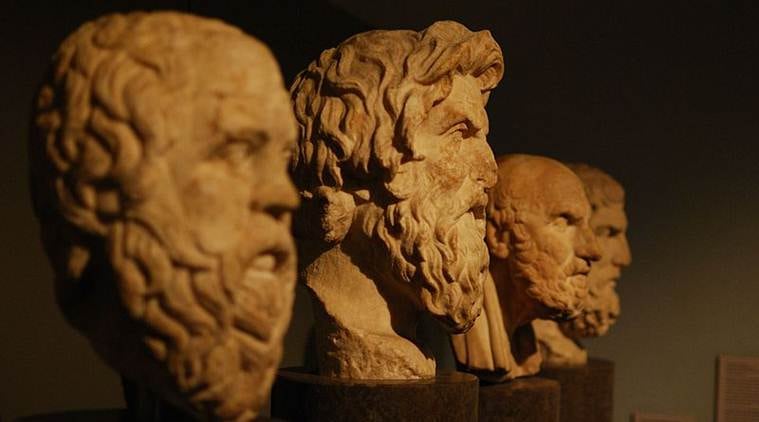
Although they appear as polar opposites, there is, or at least was, an intimate connection between democracy and tyranny, one which also troubled people in the past. The Athenian state’s experiment with democracy, almost 25 centuries ago, lasted 200 years (its demise is fantastically dated to August 2, 338 BCE, even more precisely to three in the afternoon, when the Macedonians overwhelmed the Athenians and their allies in the battle of Chaeronea), proving once again the truism, nothing lasts.
Though the first democracies arose earlier, possibly influenced by the colonisation of coastal territories in the late 700s, the Athenian version is best known. Elsewhere, monarchies gave way to tyrannies, so smoothly sometimes there was little perceived difference between monarch and tyrant; dynastic succession did not always distinguish them. Phaidon of Argos, though a legitimate ruler, notes Aristotle, “was a king who became a tyrant” (because of his despotic acts). The ideology of the turranos is complicated by the fact that although demonised by the intellectual elites, many of these tyrants had popular support and indeed came to power with the help of the demos (public): Though their detractors show them as taking advantage of the ignorance of the populace and, once having gained power, of holding on to it by force and deception.
The odium now associated with the word turranos, was slow to grow (Sanskrit and classical Chinese have no equivalent term). The tyrant was a usurper, one who seized power, or even came to power through illegitimate means (illegitimate as far as the ruling class were concerned at any rate: The tyrant was not born to rule). Tyrants could come to power in one of several different ways. Usually some member of the ruling elite would take control during times of emergency (like Pericles at Athens, who was called “the first citizen of the democracy”). Such a person might, and often did, decline to step down when the crisis had passed, like Dionysus at Syracuse. Other ways of becoming sole ruler was to marry a widowed queen and thereby become king (or tyrant), as did Oedipus at Thebes who “saved the city from pestilence”. Of course, he had unknowingly widowed the queen-mother!
Tyrannical rule was not necessarily tyrannical in our sense of the term. The tyrant, like all rulers, had to balance the interests of the rich and the poor, while maintaining if not enhancing his own prestige and honour. Greek tyrants were patrons of the arts, attracting poets and singers to their courts. Naturally, the dominant poetic mode of the time were songs of praise, eulogising powerful patrons, though often with an undercurrent of irony increasingly laced with hope-filled moralising. Tyrants were also big on monumental construction — temples, palaces, amphitheatres and baths. Designed both to impress their subjects as well as to glorify themselves. Indeed fame and glory, through war or competitive games, became the conceptual handmaids of absolute rulers.
Although he was one of them, the tyrant was feared by the aristocrats, for it was their wealth he was likely to seize. Many tyrants in those days came to power through the help of the people. Thus the close link between democracy and tyranny: Tyrants with popular support could seize and retain power. Aristotle notes as much in his study of Greek constitutional history: “And in old times whenever the same man became leader of the people and general, they used to change the constitution to a tyranny; for almost the largest number of the tyrants of early days have arisen from being leaders of the people.”
Winning popular support and retaining it was not always easy: Peisistratus rode into Athens once on a chariot driven by an actor dressed as the goddess Athena. Grandiloquence and persuasion were keys to the bellies if not the minds of the citizens. Once in place, the tyrant was difficult if not impossible to dislodge; it often needed outside help. The Athenians lived with the embarrassment of having their democracy restored with the aid of their anti-democratic arch rival Sparta in 403 BC when the short-lived but bloody reign of the 30 tyrants was brought to an end. Politics was never not about estranged bedfellows.
Anticipating Shakespeare, the Athenians likened the tyrant to “a serpents egg which, hatch’d, would as his kind grow mischievous”, and took rather elaborate if questionable steps to prevent his growth. Their chief instrument was ostracism: Any citizen could bring a charge against any (prominent) person who, in his view, might violently seize power; the whole citizen body could then vote him into exile. Like extradition today, potentially undesirable persons could be legally got rid of (without their actually having committed a crime).
But while tyrants were feared and hated, they were also the subject of adulation. The hubris of Gyges, tyrant of Lydia, appeared as “an unrestrained sensuality that went hand in hand with unrestrained political power”. Plato too touches upon the theme of tyrant envy. All men envy tyrants in the way that all men worship wealth and power. The tyrant is above the laws and can do what he wants; a complete lack of restraint or moderation (an aristocratic virtue) typically characterised his rule.
The chief difference between tyranny and democracy was the place accorded to free speech. Not surprisingly, tyrants didn’t like to hear what they didn’t like. Poetic speech was usually duplicitous, not merely delighting, but seeking refuge in ambiguity. Comedy itself was said to have arisen among uncouth peasantry, along with the democracy, in Megara. Political comedy only flourished in democratic Athens. It suffered, like most political discourse, a quick demise. In the later Greek anecdotal tradition, those who stood up to tyrants were usually philosophers, unimpressed by either wealth or power and unapologetic in the face of death. “For to oppose evil men is the chief aim we set ourselves,” Philosophy reminds Boethius, as she recounts her loss of prestige and increasing neglect.
The writer taught philosophy in Delhi University